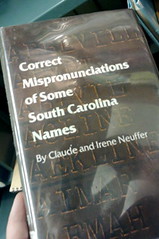- You know more than you think you know.
- Often, to get folks started, I ask if they know their grandparents or other relatives who would have been alive in 1930 and would have appeared on the 1930 census. I ask if they know any maiden names, great-grandparents names, the names of any siblings, and birth or death dates. Most folks claim not to know these more specific details. However, when I present them with a few options, they immediately pick one out because "that was her maiden name" or "that's his brother and sister!" It always turns out that everyone knows more than they thought they knew.
- Try and brainstorm everything you know about a particular ancestor. Think back on family events or stories the ancestor told and you might be surprised about what you know.
- Not everything you know is true.
- Although many people have a smattering of information on their ancestors, if this knowledge isn't backed up by documentation or previous research, it might not be true. Really, some of the information that you know, might actually be inferred or mis-remembered. Just because your grandfather lived his entire life in Kansas City, KS, doesn't mean he didn't die in Kansas City, MO. Maybe you remember going to an ancestor's funeral when you were a small child - do you know 100% that you remember the correct funeral or location for the ancestor? It can be easy to confuse childhood memories.
- Don't limit your research just because you know something is true. Be willing to research outside of the box.
 Just because it's spelled that way, doesn't mean it might not be found spelled this way.
Just because it's spelled that way, doesn't mean it might not be found spelled this way.- I know that your family spells their name McGuire doesn't mean that it won't be spelled Macguire on a record. Names were often spelled differently at different times, before standardized records became common. Your ancestor might have spoken with an accent and a clerk wrote down the name oddly. Or perhaps your ancestor changed the way their name was spelled - I know mine did! Could your ancestors even write their name? And this applies to more than just names. Any small details might be a little different than you know.
- Don't overlook a record just because a small detail is different than you know it to be. Look at the rest of the record and see if other details add up to match your ancestor.
- There's a lot of genealogy online, all over the internet.
- Before getting started in genealogy, many folks don't realize how much information is readily available online, both for free and for a cost. And it's not just in one location - it's all over the internet.
- Make use of the large database websites, as well as state run or genealogical society sites. Try Google or another search engine to find smaller sites.
- Just because a database is online, doesn't mean it's a complete database.
- Very often there will be a database online, such as Georgia Deaths, Texas Marriages, Ohio Births, etc. Databases such as these are goldmines for genealogists - but they may not be complete. You ancestor might have been born or died inside the timeframe for the database, but are nowhere to be found. But that might not mean the record doesn't exist.
- Check the details of the database to ensure that there aren't gaps in the database that would cause your ancestor to excluded. You might try locating the original records to see if you record can be found.
- It's not true just because it's on the internet or in a book.
- There is a plethora of information out there, from written histories to online family trees. But before you blindly add this information to your own family tree... just don't! Do you know where this information comes from? What are the sources? Likely, there aren't any - so why would you believe the information?
- Although the information might be true, you can't trust it blindly. Find the sources they used or use their information as a blueprint for your own research. You don't have to completely disregard the info, just don't blindly trust it.
 It's not all online.
It's not all online.- This is one that can't be stated enough. When getting started, there's so much genealogical information online, that newbies might get tunnel vision. With so much available, they might start thinking that if it's not online it's not available. So not true!
- There is so much available in libraries or archives that has to be seen in person or might be available by research request. Don't ignore the real world records.
Anyone else have any other tips for those new to genealogy?

5 comments:
CLAP CLAP CLAP!
Great post!
You know, I've thought about getting into genealogy research. But I couldn't think of an interesting reason to do so. Like, for example, finding the answer to a question people have been asking me since I've been able to talk . . .
Nope. I have no motivation in researching my family at all . .
You know Phil, a lot of people get into genealogy just to see if they are related to famous people...
Amen! Great Post. Unfortunately, there are very few who truly understand even after you explain it to them.
Oh, yes! Exactly right for all your points above. Good post.
Post a Comment